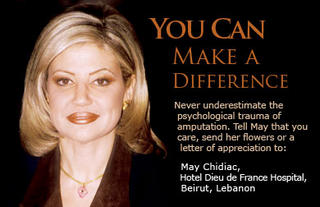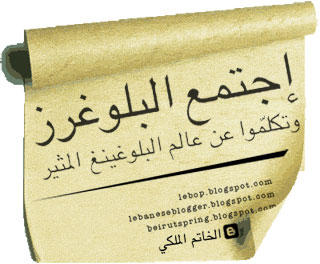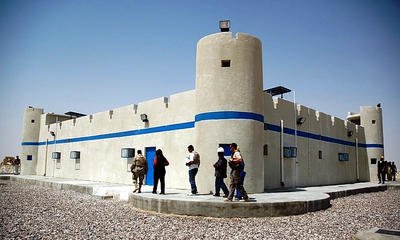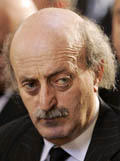Well I now know some of you actually read my last entry
“Lebanon Updates” because there has been a lot of traffic and new commenters on….
Janfoora’s blog!! So please feel free to read through five A4 pages; it’s past midnight on a Beirut Saturday and I’m still blogging, so they have to be worth something. Thanks go to Raja for single-handedly inflicting more damage on my social life than four years of Aub engineering study, seven months in the Army, and a very demanding job!!!
Anyway, here is a more profound analysis, mostly as replies to Raja’s inquiries, on my entry
“Lebanon Updates”. First, please note that I am intentionally ignoring the HA arms issue for now mainly because it often leads to futile discussions and tediously unsubstantiated theorizing, while focusing on more tangible issues is proving very helpful and enlightening, plus it brings out some not-so-groundless thoughts in most of us.
1. Is the street really obsessed with the Mehlis report and its consequences? Please be more specific:
Well, I must lay some background for my statement. I think we can safely say that, while “The Truth” was the headline demand of the massive rallying that took place in Lebanon since Feb. 14, there were other demands. The most pragmatic of these were very narrow and “sect-specific”, though later portrayed as national accomplishments; examples here are the return of Aoun, freeing of Geagea and Dinneyeh group.
Then again, there were many other major demands for the rallies that were more popular and widespread, in a trans-sectarian way that gave the movement much of its momentum and glow. These were mostly associated with the removal of the “Syrian occupation’s influence” from the Lebanese system, political life, and everyday life. This is when you’d hear how the Syrians played one sect against the other to maintain control. I won’t drag into a position where I’ll be accused of defending the Ba’ath regime, and it’s irrelevant for now; let’s say that there were many major demands associated with the creation of a new Lebanon, from the election law to the security branches. We now know that these ideas have been delayed (indefinitely, = aborted) by our politicians, or carried out in distorted counter-productive ways. (Example: I am suggesting that the breakdown of most security networks essentially led to looser security. I believe that the enforcement of security by the army is not a very healthy practice, and only reflects a lack of situational awareness on part of some security branches. The more lost our intelligence people are, the more army you will see on the street. I definitely need other inputs on this from ground zero, but I think needing so many soldiers, not even policemen, is a bad sign).
Anyway, the Mehlis report is the only chance for a “gain” out of the “Cedar Revolution”. Except the Syrian withdrawal, all the “gains” attained so far were not very tangible to the March 14 people as a whole or even of interest in everyday life. Most Lebanese, especially Muslims, do not associate with the release of Geagea or the return of Aoun as a gain or a big step forward. This is one reason why people would anticipate the report; in their minds, they made it happen. It is a great feeling and much-needed fulfillment in this time of despair.
I was in Martyrs’ Square when the Karami Government fell on Feb. 28, and I SMS’ed a friend saying I was amazed by “the power of the people”. Now I realize that this assumed “power” is one more “opium”, actually “sedative” is more precise, just like vain/fake/assumed victories would be used as proof of accomplishment, to justify failures in other domains. An example here is using the Arab Israeli conflict to justify political atrocities; Hafez Assad was a “hero of peace and war”, so it was ok for him to be a dictator; the Syrian people’s fulfillment with being a “proud Arab nation, making the last stand against Israel and the US” would make up for the oppression they underwent, or so the logic assumes.
On a brighter note, the mere questioning of security chiefs is a breakthrough for Lebanon, regardless of my personal opinion of the theatricals surrounding this case. It is a positive step, and the Mehlis committee is definitely making effort towards accountability in the Lebanese system. Ironically enough, I see that the committee itself still has to provide a transparent account of its composition, dynamics, method of operation, and mechanisms. I believe his account should be provided in the final report, at the latest.
On the other hand, there is a fear of the consequences, especially in terms of the Sunni-Shiite relations. There is also the “Jumblatt fear”, which I will address in next part.
2. With regards to Jumblatt's stand on Lebanon's "Arab identity," please explain why you think he's so worried. Considering that Future, Hizballah and Jumby are among the most powerful players in Lebanon, one could easily assume that Lebanon's "Arab identity" (whatever the fuck that means) is pretty secure.I didn’t say I believed his worries, but I’ll give you the possible reason for such worries. In theory, it’s related to the fact that a Syrian involvement, once confirmed by Mehlis, will alienate Lebanon more from Syria. In pure economic terms, this basically blocks our only gateway to Arab countries; remember the border issue many weeks ago.
But the main point here seems to be that of Lebanon’s stand in regional politics. Refer to various declaration of neutralizing Lebanon in the Arab-Israeli conflict, mostly on the basis that Lebanon has “paid too much”, and supplemented by claims that this conflict is on its way to resolution, with other countries building better relations.
Refer also to the “choice” we will supposedly have to make, now that we are no longer under a Syrian guardian, in terms of which “axis” to join: the “axis of evil” with Iran and Syria, or the new free world under Bush. The issue of HA arms is being portrayed as the essence of this process of choice.
On a narrower scale, Jumblatt knows that his status and that of his sect will be affected if Lebanon’s ties with the Arabs are weakened, or re-channeled through France/US proxy. He has no external “foreign” powers protecting him, and the current dependence of the Bush administration on Saad is temporary and very fragile, and will change if the US-Saudi relations are shaken, if they deem him and his constituency unfit for certain roles, and/or if the US tries to replace the Syrian guardian with an Israeli one.
3. I just wanted to mention that I disagree with your assertion about Lebanese growth and relations with its neighbors. If Lebanese economic growth instigates growth in certain sectors of our neighors' economy, they will think twice before doing anything. Furthermore, if Lebanon allies itself with regional powers that are not necessarily immediate neighbors, the threat from our neighbors could be mitigated. What do you think?
I agree with this in general, but you are ignoring the effect of any comprehensive peace agreement, which will see full economic relations between the Arabs and Israel enforced. Keep in mind the current flourishing of Israeli trade offices in some Gulf countries. Anyone we may consider allying ourselves with will prefer Israel. The Arabs could afford to help “beautiful Lebanon” when they controlled the oil prices, but now the US is doing its best to assume full control of prices indefinitely.
4. Hassan, when you mention the failure of the ruling majority to give guarnatees to the non-HA Shi'a that their rights will not be compromised, what exactly do you mean? What kind of guarantees? If political, then elaborate. If economic, also, please elaborate. You give an example of jobs. But could anyone guarantee jobs? And even if that were possible would such a guarantee entice members of the Shi'a community to shift political loyalties.Whether we like it or not, the Shia considered themselves the underdogs of the pre-war politics in Lebanon. They were also the first to suffer from the Israelis, even before 1948. Their areas were the most underprivileged. They never had a foreign “protector” like the others. Even the “Shiite post” of Speaker of Parliament was considered very weak and totally under the control of the Sunni-Maronite alliance. Essentially, it is the Shiites who have most to gain in a non-sectarian Lebanon simply because they have been discriminated against for so long.
In this sense, the Ta’ef agreement’s setting of more powers for them, and the supposed eventuality of abolishing most forms of political sectarianism, is viewed as a gain. The questioning of the rights of the Speaker of Parliament, and the asking that the duration of the post be reconsidered, were received with much alarm. Imagine if the speaker is to be re-elected in one year, as I think the old system was. This suggests that any Shiite figure aspiring to hold that post would be better off “sacrificing” the Shiite interest to please the majority block, which was a Sunni-Maronite coalition at most times. Accounts flourished recently of how the Maronite and Sunni politicians would play the members of the “Speaker of Parliament Candidate” club against each other and choose a new member of the three or four prospectus (Hemadeh, Osseiran, Ass’ad) every time, so as not to give any of them too much power.
Add to that the fact that the Shiites have relatively no economic power within Lebanon. Surely there are tons of very rich Shiite businessmen, but the absolute majority of them made their money abroad, in Africa or elsewhere, and continues to conduct business there. They can offer almost no jobs in Lebanon, and definitely little economic leverage in everyday life. Again, the Sunni-Maronite elite hold most economic powers. This is one of the reasons that the abolishing of exclusive agencies gained such politico-sectarian fervor a couple of years ago.
However, jobs in the public sector could be guaranteed to the growing number of unemployed Shiite youth if the sectarian sharing is abolished. This is why I gave the example of the officer applicants.
Also add to that the fact that the Syria-Iran alliance is the first ever to offer the Shiites an external protector, which other significant players have had for tens of years, even more. The demands for neutralizing Lebanon in regional affairs basically meant cutting off any links with those protectors, while the other sects kept their patrons. It is important to note the duality of the relation with Syria. The Syrians gave more powers in some political aspects, but did little to the ordinary Shiite guy in terms of socio-economic conditions. The Syrians were damaging the workers and farmers of the sect like those of every other sect, and maybe more, in some opinions. However, to keep the fine sectarian balance, they were also delaying the cancellation of some aspects of political sectarianism, which, as I explained, is a big factor in Shiite unemployment. The Shiites would join the move for a New Lebanon if their political rights were not questioned, and if their socio-economic rights were improved to equal those of others.
As for shifting political alliances, it would have been possible, in a more fundamental form. For me, the times when it looked like Berry would not be re-elected Speaker were when I admired the “Cedar Revolution” the most. However, the targeting of supposed “Shiite rights” meant more clustering, especially when Berry’s practices were being questioned under the general title of redefining the Speaker post. The HA decision to support Berry would not have been “necessary” had there been more acceptance for change within the sect. This acceptance would have been possible if the “Cedar Revolution” had had a clear vision and statement, truly geared towards a unified Lebanon that provides equal rights for all. Even Saad wasted his own father’s iconic image, favoring trivial political gains. The Shiite fears escalated when the then-Opposition decided to delay all negotiations till after the elections, and preferred to “let the street arbitrate”. (al-2i7tikam ila alshare3).
Again, ideologies come and go. It is the threat to basic rights that moves man’s deepest workings.
I’m thinking I’ll try to go out now. I’ll answer your comments later. Tomorrow, Jiyyeh.
I love this country! Wish you were here!






